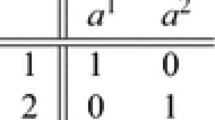Abstract
In the context of uncertainty, belief-weighted relative utilitarianism consists in comparing acts according to a weighted sum of the (0, 1) -normalized subjective expected utilities they yield. The weights may change with the profile of beliefs but do not depend upon the profile of individual utilities for the outcomes. This class of social welfare functions is characterized by the Pareto principle, the sure-thing principle, a continuity condition, and an independence condition requiring that the social ranking of two acts is unaffected by the addition of an outcome that leaves everyone’s best and worst outcomes unchanged. The weights must be constant if the social ranking of constant acts is independent of individual beliefs. Anonymity then pins down plain relative utilitarianism: acts are compared according the sum of (0, 1)-normalized subjective expected utilities they generate.
Similar content being viewed by others
Explore related subjects
Discover the latest articles and news from researchers in related subjects, suggested using machine learning.Notes
Postulate P3 guarantees the existence of a state-independent ordering of the outcomes interpretable as the “taste” component of the preference relation over acts. Postulate P4 guarantees the existence of a well-defined subjective likelihood relation on events intepretable as the “belief” component of the preference relation.
The Pareto principle is controversial in the current context: see Gilboa et al. (2004) and Gilboa et al. (2014) for a criticism and two proposals. The literature is divided into (i) a strand that maintains the SEU requirement on society’s preference but weakens the Pareto principle and (ii) a strand that keeps the Pareto principle but weakens the SEU axiom. Our contribution belongs to the latter strand.
In Sprumont (2018), we argue that a stronger independence condition is often justified and leads to comparing acts on the basis of some weighted product of the normalized utilities they generate. The social preference thus obtained violates the sure-thing principle.
The bulk of the literature on state-dependent subjective expected utility assumes a finite state space. See however Wakker and Zank (1999) for a formulation using a Savage state space.
The literature often refers to what we call the Pareto Principle as the Ex-ante Pareto Principle in order to distinguish it from the (weaker) Ex-post Pareto Principle. The latter says that the social preference over outcomes (if well-defined) should respect the individual preferences over outcomes.
In contrast, three of Dhillon and Mertens’ (1999) axioms—Continuity, Independence of Redundant Alternatives, and Monotonicity—impose restrictions across preference profiles.
Because the beliefs \(p^{*}(R_{1}),\ldots ,p^{*}(R_{n})\) are non-atomic measures, proviso (iii) in this axiom can be rewritten as follows: for all \( x^{\prime }\in X^{\prime }\) and \(i\in N\) there exists \(a\in A(X)\) such that \( x^{\prime }I_{i}a.\)
Although widely accepted and much weaker than Independence of Inessential Expansions, Independence of Redundant Outcomes is not innocuous. Imagine two colleagues 1 and 2 who regularly have lunch together. If there are two nearby restaurants a and b, 1 prefers a over b and 2 prefers b over a, having lunch at b half of the time seems fair. If there are ten restaurants, 1 finds \(a_{1},\ldots ,a_{9}\) equally good but dislikes b, and 2 likes b but finds \(a_{1},\ldots ,a_{9}\) equally bad, is it still fair for the two colleagues to have lunch at b half of the time?
References
Anscombe F, Aumann R (1963) A definition of subjective probability. Ann Math Stat 34:199–205
Arrow K (1963) Social choice and individual values, 2nd edn. Wiley, New York
Börgers T, Choo Y-M (2017a) A counterexample to Dhillon (1998). Soc Choice Welf 48:837–843
Börgers T, Choo Y-M (2017b) Revealed relative utilitarianism. University of Michigan, Mimeo
Chambers C, Hayashi T (2006) Preference aggregation under uncertainty: Savage vs. Pareto. Games Econ Behav 54:430–440
Dhillon A (1998) Extended Pareto rules and relative utilitarianism. Soc Choice Welf 15:521–542
Dhillon A, Mertens J-F (1999) Relative utilitarianism. Econometrica 67:471–498
Gilboa I, Samet D, Schmeidler D (2004) Utilitarian aggregation of beliefs and tastes. J Polit Econ 112:932–938
Gilboa I, Samuelson L, Schmeidler D (2014) No-betting Pareto dominance. Econometrica 82:1405–1442
Karni E (1998) Impartiality: definition and representation. Econometrica 66:1405–1415
Lyapunov A (1940) Sur les fonctions-vecteurs complètement additives. Bulletin de l’Académie des Sciences de I’URSS, Série Mathématique 4:465–478
Marchant T (2018) Utilitarianism without individual utilities. Ghent University, Mimeo
Mongin P (1995) Consistent Bayesian aggregation. J Econ Theory 66:313–351
Mongin P (1998) The paradox of the Bayesian experts and state-dependent utility theory. J Math Econ 29:331–361
Savage L (1954) The foundations of statistics. Wiley, New York
Segal U (2000) Let’s agree that all dictatorships are equally bad. J Polit Econ 108:569–589
Sprumont Y (2018) Belief-weighted Nash aggregation of Savage preferences. J Econ Theory 178:222–245
Wakker P, Zank H (1999) State dependent expected utility for Savage’s state space. Math Oper Res 24:8–34
Author information
Authors and Affiliations
Corresponding author
Additional information
Publisher's Note
Springer Nature remains neutral with regard to jurisdictional claims in published maps and institutional affiliations.
This paper results from research supported by a grant from the FRQSC. I thank two reviewers and an associate editor for very hepful remarks and suggestions.
Rights and permissions
About this article
Cite this article
Sprumont, Y. Relative utilitarianism under uncertainty. Soc Choice Welf 53, 621–639 (2019). https://doi.org/10.1007/s00355-019-01202-9
Received:
Accepted:
Published:
Issue Date:
DOI: https://doi.org/10.1007/s00355-019-01202-9



